El desarrollo de la política durante el período moderno
La constante evolución de la política va de la mano con el incesante desarrollo de la humanidad, siendo acorde con la variedad de modelos sociales que han ocurrido durante los diferentes períodos de la historia, las cuales se ajustan a las posiciones políticas creando pautas que establecen o regulan las relaciones de los ciudadanos. Todo esto no se escapa de la trayectoria humanística dentro del Período Moderno y aun así, se continúa practicando consecutivamente durante el Período Contemporáneo.
Se enmarca el período moderno como la representación concreta de la monarquía absoluta en una forma de gobierno que consolidó la unión territorial y cultural de cada pueblo, eliminando el modelo feudal. En consecuencia, se muestran las dos caras (según Hobbes y Locke) de la filosofía política del siglo XVII; y por último, se presentan los teóricos políticos de la “ilustración francesa” (Montesquieu y Rousseau).
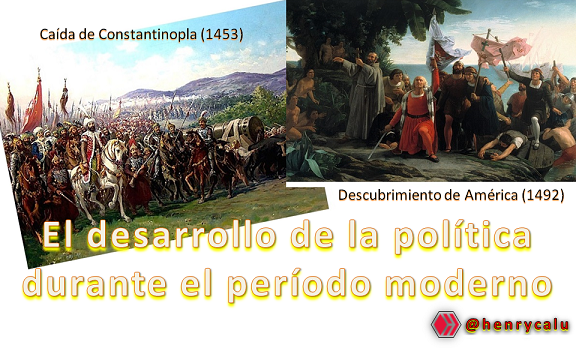.png)
Período Moderno
El siglo XVI es testigo de la consolidación de la unidad territorial de los Estados, en detrimento del modelo político feudal, gracias a la gran concentración de extensos territorios que estarán controlados por un fuerte poder central, el cual se conocerá bajo el nombre de Monarquía Absoluta.
Este modelo político se concreta cuando el rey, encarnando el ideal nacional de la unión e invocando la ley divina, posee, además de hecho y derecho, los atributos de la soberanía: potestad de dictar las leyes, de administrar justicia, de percibir impuestos, de tener un ejército permanente, de nombrar a los funcionarios del Estado, y de delegar jurisdicciones de excepción cuando lo considere conveniente. A ello debe añadirse el hecho, que bajo el modelo de monarquía absoluta se refuerzan las concepciones feudales en lo referente a las relaciones del monarca con los súbditos y vasallos.
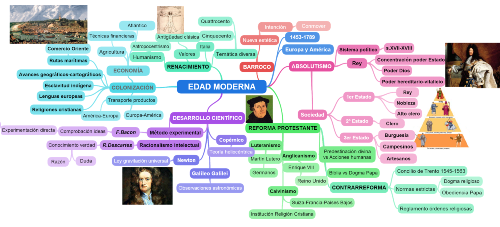
Pero además de lo anterior, no debe pasarse por alto que una de las causas del fortalecimiento del modelo de la monarquía absoluta es la rivalidad existente entre la vieja nobleza y la burguesía, esa clase social que poco a poco se ha ido consolidando y que será la protagonista de primer orden durante toda la Edad Moderna. Dadas sus respectivas ambiciones, tanto los burgueses como los nobles ayudarán a fortalecer cada día más el poder del soberano. Por un lado, el rey, que necesita más a los burgueses para sus finanzas y sus cuerpos de funcionarios, obtiene fácilmente su apoyo y obediencia. Ello se debe al hecho de que el objetivo de la burguesía es ennoblecerse y a la vez es consciente que el único que le puede satisfacer ese deseo es el monarca, quien efectivamente lo hace. Por lo tanto, se tiene a un importante número de burgueses que se han convertido en aristócratas, pero sin perder su espíritu mercantilista. Por otro lado, la nobleza, que se ha visto afectada económicamente por el ascenso de la burguesía, busca ponerse al servicio del rey con el fin de que éste les brinde determinadas concesiones que les permitan mantener su posición privilegiada.
El tomar una posición, a favor o en contra de este modelo de gobierno, será lo que guiará la discusión política del período moderno.
A la luz de la guerra civil y de la revolución que marcaron la historia inglesa del siglo XVII, que llevaron a dejar atrás el modelo de la monarquía absoluta por uno de Monarquía Parlamentaria, y que testimoniaron el inevitable ascenso de la burguesía, los filósofos Tomas Hobbes (1588-1679) y John Locke (1632-1704) sentaron las bases de sendas doctrinas políticas, aunque ubicadas en distintas orillas ideológicas. Hobbes se erigió como defensor del modelo de la monarquía absoluta, mientras que Locke se inclinó por la causa de un gobierno parlamentario y de un estado liberal y asociativo.
Fue en el famoso Leviathan, en el que Hobbes sintetizó su teoría del Estado, la cual partía de la igualdad entre todos los seres humanos, quienes, lógicamente, aspiraban a obtener las mismas cosas que complacieran sus necesidades básicas. Dada esta situación, sería obvio que el estado natural del hombre es la guerra de todos contra todos, debido a la intención de no estar nunca en posición desventajosa frente al otro, y por lo tanto “el hombre sería un depredador para el propio ser humano”. Pero según el filósofo inglés Hobbes, ese hombre sería igualmente consciente que en medio de esa permanencia discordia nunca existiría un mínimo de seguridad y la vida sería absolutamente miserable. Por ello, decidiría cambiar ese estado de naturaleza por un estado civil, mediante acuerdo en el que cada hombre transferiría su derecho al Estado. Entonces sería éste el que determinaría el poder, pero un poder que no estaría limitado por los hombres sino por su propia potencia. En consecuencia, se trataría de un Estado absoluto, al igual que el “Leviathan” el cual aparece en la Biblia, tendría la capacidad de devorar a aquellos individuos que lo han conformado. Esta teoría sirvió de fundamento para apoyar el “derecho divino” que poseían los reyes al detentar el poder absoluto; así como para sustentar la necesidad de un gobierno parental al que todo hombre estaría sometido.
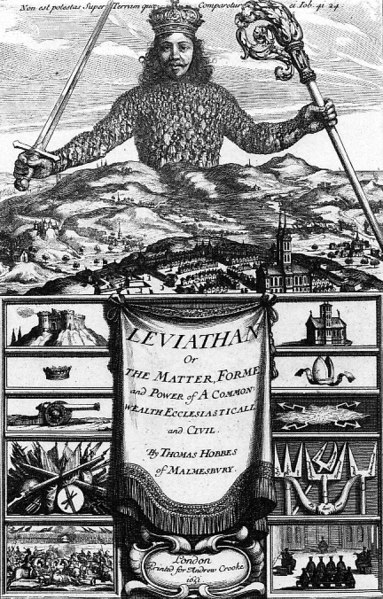
“El Leviathan, de Thomas Hobbes, es una justificación del absolutismo frente a la Revolución Inglesa, pero su argumentación es plenamente secular, al contrario de la de Bossuet, que simultáneamente está defendiendo la teoría del derecho divino de los reyes. El monstruo que puede ejercer sin límites su poder lo hace porque el cuerpo social (del que cada individuo es una célula, como aparece en el grabado) le cede el poder, porque retenerlo cada uno para sí en un estado de naturaleza solo llevaría a la guerra de todos contra todos. La expresión Homo homini lupus (el hombre es un lobo para el hombre), que parece no ser suya aunque se suele atribuir a Hobbes, lo expresa muy bien.”
En su “Primera carta sobre la tolerancia” y en el “Ensayo sobre el gobierno civil”, Locke esbozará una doctrina política de signo contrario a la de Hobbes. Para él, en el estado de naturaleza los seres humanos son libres e iguales entre sí. Además están regidos por la razón que les señala cuáles son sus derechos naturales. Todos estos derechos son sagrados; Dios se los ha otorgado a todos los seres humanos (sin distinción ni restricción alguna) y anteceden a la conformación de cualquier tipo de sociedad. Pero para poder disfrutarlos, todos los seres humanos deben constituirse en sociedad. Sociedad que se fundamentará en un contrato social que realizarán sus distintos miembros. Esa colectividad de seres humanos, que ha decidido asociarse, podrá ejercer directamente su poder y en ese caso se estaría ante un sistema democrático. Aunque también, podrá optar por delegar el poder en un grupo de personas o en un solo hombre, constituyéndose respectivamente un sistema oligárquico o monárquico. Pero en ambos casos, quién detente el poder soberano deberá regirse por las clausulas del contrato (constitución); radicando en este punto la principal diferencia respecto al modelo de Hobbes.
El siglo XVIII, también conocido como el “siglo de las luces”, asistió al encumbramiento de la razón como la principal herramienta con que contaba el ser humano para explicar no sólo su ser y todos sus accidentes, sino también todos los fenómenos del mundo. El ideal de la “ilustración francesa” era oponer el raciocinio a todas aquellas creencias que se fundamentaran en la tradición o en lo sobre natural. De esa apuesta por la razón se deriva la idea de considerar al hombre como la unidad aprehensora de la totalidad de la naturaleza, por lo tanto la humanidad, en cuanto conjunto de los seres humanos, debía ser el centro del pensamiento filosófico. En forma acorde con lo anterior, la “ilustración” debía enfrentarse con la monarquía absoluta y la religión que, de acuerdo a sus postulados iban en contra de la dignidad del ser humano; planteando en el campo de las ideas políticas la posibilidad de instaurar un nuevo régimen, el cual podía ir desde el gobierno oligárquico hasta la democracia socializante, pasando por la monarquía liberal.
En este caso de la mencionada “ilustración francesa”, serán dos los filósofos que descollarán por sus postulados políticos: Carlos de Secondat, Barón de Montesquieu (1689-1755) y Juan Jacobo Rousseau (1712-1778).
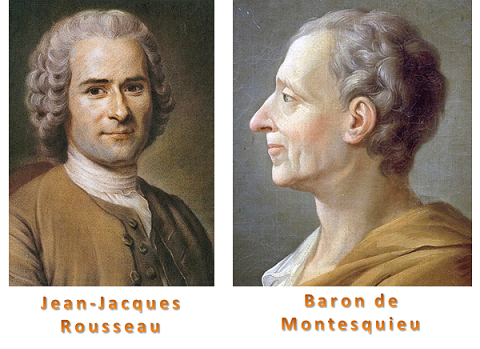
El Barón de Montesquieu, cuya obra siempre estará centrada en la indagación sobre los conceptos de virtud y libertad, postulará que el mejor modelo de vida no es aquel que se fundamenta en el hedonismo y el libertinaje, sino al contrario, aquella en que los conceptos señalados como la virtud y la libertad, alcancen su máximo desarrollo, fruto de un entrelazarse entre sí. Inscrito dentro de ese marco teórico, aparece “El espíritu de las leyes”, la obra cardinal de Montesquieu en lo que se refiere a su doctrina política. Ella se plantea que los hombres y las leyes que los rigen no son algo etéreo y fantástico, sino que al contrario se fundamentan en “relaciones necesarias que se derivan de la naturaleza de las cosas”. De ello se desprenderá que cualquier modelo de gobierno legítimo que se intente imponer, siempre responderá a ese condicionante.
Según este filósofo habría tres tipos de gobiernos:
- Gobierno Republicano, en donde el pueblo en su conjunto o bien sólo una parte de él, detenta el poder soberano. En el primer caso se trataría de una democracia y en el segundo de una aristocracia.
- Gobierno Monárquico, sólo una persona gobernaría, pero atendiéndose a unas “leyes fijas y establecidas” por el conjunto de la sociedad
- Gobierno Tiránico, es la contraposición de lo anterior, ya que un solo sujeto detentaría el control, pero además no estaría guiado por el bien común sino por la arbitrariedad y el capricho para ejercer siempre el poder y perpetuarse como soberano.
Quizás el principal legado que dejó Montesquieu a la historia de las ideas políticas fue su postulado de que independientemente del tipo de gobierno que se establezca, siempre y cuando respete la libertad civil, en él deberá establecerse una separación de poderes de manera que no queden bajo el control de una misma entidad política, y que además puedan ejercer una labor de fiscalización entre ellos mismos.
De acuerdo con esta teoría, tres serían los poderes:
- Poder Ejecutivo, encargado de administrar los bienes públicos como las finanzas o economía.
- Poder Legislativo, el cual establecerá las leyes que deben regir las actividades en el seno de la sociedad.
- Poder Judicial, que tendría la misión de juzgar y sancionar a aquellos que infringiesen las leyes.
Dada esa división de poderes, para Montesquieu el poder ejecutivo podía seguir en manos del rey, mientras que el legislativo debería estar conformado por magistrados, miembros de la nobleza y el clero (iglesia); y por último, el judicial, que se sustentaría en grupos provenientes de los parlamentos.
Igual de trascendente que “El espíritu de las leyes” es el “contrato social” de Rousseau. Ahí, el filósofo de Ginebra (Suiza), apunta que la sociedad civil no está subordinada al Estado, pero que al mismo tiempo sostiene que la única posibilidad para que un individuo sea libre es en el seno de la comunidad. Por ello se retoma la idea de “contrato social”, pero a diferencia de lo postulado por Hobber, no se tratará de un simple contrato entre individuos, y respecto a lo sostenido por Locke, no será un “contrato bilateral” en el que el conjunto de individuos ceden sus poderes a un hombre o a un grupo de hombres. Para Rousseau el contrato se realiza con la comunidad, cuya voluntad general se convierte en el fundamento de todo poder político.
Por ello con la intención de volver compatibles las ideas de libertad e igualdad. El filósofo Rousseau representa una sociedad civil consistente en una comunidad de hombres libres que gozan de una igualdad política y de la cual nadie ha de ser excluido. Por consiguiente, un pueblo libre no obedecería nada más que a las leyes que lo constituyen como una sociedad organizada, y por lo tanto, conserva su libertad bajo esas leyes, ya que en definitiva sólo se obedecería a sí mismo.
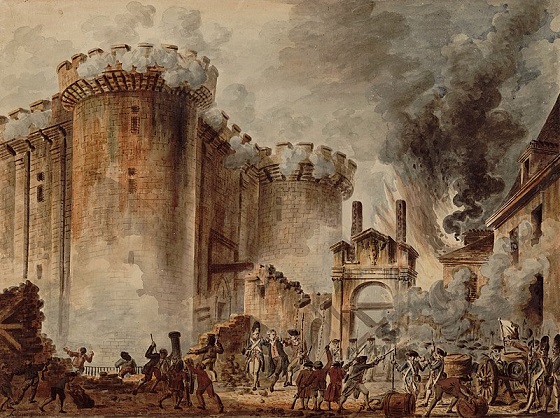
In the center, the arrest of the Marquis de Launay is shown
En el centro se apreciaba el arresto del Marqués de Launay
Todas estas ideas políticas y otras más, provenientes de otros pensadores de la “ilustración”, fueron retomadas durante la Revolución Francesa (acontecimiento que pone fin a la época moderna y da inicio al período contemporáneo de la historia de la humanidad). La enorme importancia que poseen estas ideas políticas, no es sólo que causaron una gran revolución mundial dentro de la sociedad, sino que aun siguen vigentes y mejorando las condiciones de organización política-social-económica dentro de los pueblos del mundo, debido a que quedaron plasmadas en la Declaración de los derechos del hombre y del ciudadano.

Y recuerde practicar siempre
el amor por la naturaleza,
el Creador del Universo
¡ te lo recompensará !
✧✦✧ @henrycalu ✧✦✧

The development of politics during the modern period
The constant evolution of politics goes hand in hand with the incessant development of humanity, being in accordance with the variety of social models that have occurred during the different periods of history, which adjust to the political positions creating guidelines that establish or regulate the relations of citizens. All this does not escape from the humanistic trajectory within the Modern Period and yet, it continues to be practiced consecutively during the Contemporary Period.
The modern period is framed as the concrete representation of absolute monarchy in a form of government that consolidated the territorial and cultural union of each people, eliminating the feudal model. Consequently, the two faces (according to Hobbes and Locke) of the political philosophy of the 17th century are shown; and finally, the political theorists of the "French enlightenment" (Montesquieu and Rousseau) are presented.
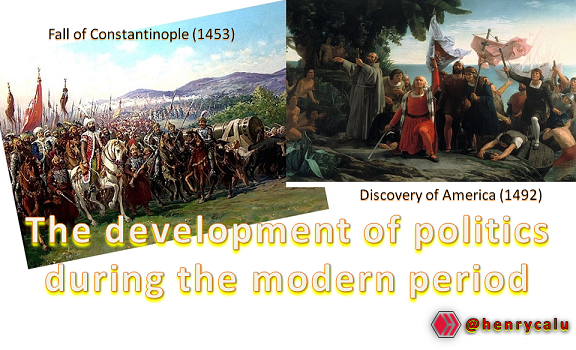.png)
Modern Period
The 16th century witnessed the consolidation of the territorial unity of the States, to the detriment of the feudal political model, thanks to the great concentration of vast territories that were controlled by a strong central power, which became known as Absolute Monarchy.
This political model takes shape when the king, embodying the national ideal of union and invoking divine law, possesses, in addition to fact and law, the attributes of sovereignty: the power to dictate laws, to administer justice, to levy taxes, to have a permanent army, to appoint State officials, and to delegate exceptional jurisdictions when he deems it convenient. To this must be added the fact that under the model of absolute monarchy the feudal conceptions are reinforced with regard to the relations of the monarch with his subjects and vassals.

But in addition to the above, it should not be overlooked that one of the causes of the strengthening of the model of absolute monarchy is the rivalry between the old nobility and the bourgeoisie, that social class that has been gradually consolidating and that will be the protagonist of the first order throughout the Modern Age. Given their respective ambitions, both the bourgeois and the nobles will help to strengthen the power of the sovereign. On the one hand, the king, who needs the burghers more for his finances and his corps of officials, easily obtains their support and obedience. This is due to the fact that the aim of the bourgeoisie is to ennoble itself and at the same time it is aware that the only one who can satisfy this desire is the monarch, who indeed does so. Therefore, we have an important number of bourgeois who have become aristocrats, but without losing their mercantilist spirit. On the other hand, the nobility, which has been economically affected by the rise of the bourgeoisie, seeks to place itself at the service of the king so that he will grant them certain concessions that will allow them to maintain their privileged position.
Taking a position, for or against this model of government, will be what will guide the political discussion of the modern period.
In the light of the civil war and the revolution that marked the English history of the 17th century, which led to leaving behind the model of absolute monarchy for one of Parliamentary Monarchy, and which witnessed the inevitable rise of the bourgeoisie, the philosophers Thomas Hobbes (1588-1679) and John Locke (1632-1704) laid the foundations of their political doctrines, although located on different ideological shores. Hobbes stood as a defender of the model of absolute monarchy, while Locke was inclined to the cause of parliamentary government and a liberal and associative state.
It was in the famous Leviathan, in which Hobbes synthesized his theory of the State, which was based on equality among all human beings, who, logically, aspired to obtain the same things that would satisfy their basic needs. Given this situation, it would be obvious that the natural state of man is the war of all against all, due to the intention of never being in a disadvantageous position in front of the other, and therefore "man would be a predator for the human being himself". But according to the English philosopher Hobbes, that man would be equally aware that in the midst of that permanent discord there would never be a minimum of security and life would be absolutely miserable. Therefore, he would decide to change this state of nature for a civil state, by means of an agreement in which each man would transfer his right to the State. It would then be the State that would determine the power, but a power that would not be limited by men but by its own power. Consequently, it would be an absolute State, like the "Leviathan" which appears in the Bible, would have the capacity to devour those individuals who have conformed it. This theory served as a foundation to support the "divine right" that kings possessed when holding absolute power; as well as to support the need for a parental government to which every man would be subject.

“Thomas Hobbes' Leviathan is a justification of absolutism in the face of the English Revolution, but its argumentation is fully secular, contrary to that of Bossuet, who is simultaneously defending the theory of the divine right of kings. The monster who can exercise his power without limits does so because the social body (of which each individual is a cell, as shown in the engraving) yields him power, because to retain it each for himself in a state of nature would only lead to war of all against all. The expression Homo homini lupus (man is a wolf to man), which seems not to be his although it is usually attributed to Hobbes, expresses it very well.”
In his First Letter on Toleration and in the Essay on Civil Government, Locke will outline a political doctrine contrary to that of Hobbes. For him, in the state of nature human beings are free and equal among themselves. Moreover, they are governed by reason, which indicates to them what their natural rights are. All these rights are sacred; God has granted them to all human beings (without distinction or restriction) and they precede the formation of any kind of society. But in order to enjoy them, all human beings must form a society. Society that will be based on a social contract to be made by its different members. That collectivity of human beings, which has decided to associate, will be able to exercise its power directly and in that case it would be in front of a democratic system. However, it may also choose to delegate power to a group of people or to a single man, constituting respectively an oligarchic or monarchic system. But in both cases, whoever holds the sovereign power must be governed by the clauses of the contract (constitution); this is the main difference with respect to Hobbes' model.
The 18th century, also known as the "Age of Enlightenment", witnessed the rise of reason as the main tool available to human beings to explain not only their being and all its accidents, but also all the phenomena of the world. The ideal of the "French Enlightenment" was to oppose reason to all beliefs based on tradition or on the supernatural. From this commitment to reason derives the idea of considering man as the apprehending unit of the totality of nature, therefore humanity, as a whole of human beings, should be the center of philosophical thought. In accordance with the above, the "enlightenment" had to confront absolute monarchy and religion, which, according to its postulates, went against the dignity of the human being; raising in the field of political ideas the possibility of establishing a new regime, which could range from oligarchic government to socializing democracy, passing through liberal monarchy.
In this case of the aforementioned "French Enlightenment", two philosophers will stand out for their political postulates: Charles de Secondat, Baron de Montesquieu (1689-1755) and Jean-Jacques Rousseau (1712-1778).

Baron de Montesquieu, whose work will always be centered on the inquiry into the concepts of virtue and freedom, will postulate that the best model of life is not that which is based on hedonism and libertinism, but on the contrary, that in which the concepts of virtue and freedom reach their maximum development, the result of an intertwining between them. Inscribed within this theoretical framework is “The Spirit of the Laws, Montesquieu's cardinal work in terms of his political doctrine. It states that men and the laws that govern them are not something ethereal and fantastic, but on the contrary are based on "necessary relations that derive from the nature of things". From this it follows that any model of legitimate government that one tries to impose will always respond to this conditioning factor.
According to this philosopher there would be three types of governments:
- Republican Government, where the people as a whole or only a part of it, holds the sovereign power. In the first case it would be a democracy and in the second an aristocracy.
- Monarchical Government, only one person would govern, but following "fixed and established laws" by the whole of society.
- Tyrannical Government, is the opposite of the above, since a single subject would hold control, but also would not be guided by the common good but by arbitrariness and caprice to always exercise power and perpetuate himself as sovereign.
Perhaps the main legacy that Montesquieu left to the history of political ideas was his postulate that regardless of the type of government that is established, as long as it respects civil liberty, it should establish a separation of powers so that they are not under the control of the same political entity, and that they can also exercise a supervisory role among themselves.
According to this theory, there would be three powers:
- Executive Power, in charge of administering public goods such as finances or economy.
- Legislative Power, which would establish the laws that should govern the activities within society.
- Judicial Power, which would have the mission of judging and sanctioning those who infringed the laws.
Given this division of powers, for Montesquieu the executive power could remain in the hands of the king, while the legislative power should be made up of magistrates, members of the nobility and the clergy (church); and finally, the judicial power, which would be supported by groups coming from the parliaments.
Equally as transcendent as “The Spirit of the Laws” is Rousseau's "social contract". There, the philosopher from Geneva (Switzerland), points out that civil society is not subordinate to the State, but at the same time maintains that the only possibility for an individual to be free is within the community. Therefore, the idea of "social contract" is taken up again, but unlike Hobber's postulate, it will not be a simple contract between individuals, and unlike Locke's, it will not be a "bilateral contract" in which the group of individuals yield their powers to a man or a group of men. For Rousseau, the contract is made with the community, whose general will becomes the foundation of all political power.
Thus with the intention of making the ideas of liberty and equality compatible. The philosopher Rousseau represents a civil society consisting of a community of free men who enjoy political equality and from which no one is to be excluded. Consequently, a free people would obey nothing but the laws that constitute it as an organized society, and therefore, it retains its freedom under those laws, since it would ultimately obey only itself.

In the center, the arrest of the Marquis de Launay is shown
En el centro se apreciaba el arresto del Marqués de Launay
All these political ideas and others, coming from other thinkers of the "enlightenment", were taken up again during the French Revolution (an event that put an end to the modern era and started the contemporary period of human history). The enormous importance of these political ideas is not only that they caused a great world revolution within society, but also that they are still in force and improving the conditions of political-social-economic organization within the peoples of the world, because they were embodied in the Declaration of the Rights of Man and of the Citizen.

And remember to always practice
the love of nature,
the Creator of the Universe
will reward you !
✧✦✧ @henrycalu ✧✦✧

⇰ Rousseau: man is good by nature
Rousseau: el hombre es bueno por naturaleza
⇰ Montesquieu: theory of the social distribution of power
Montesquieu: teoría de la distribución social del poder
⇰ Political reflection in Hobbes and Rousseau
La reflexión política en Hobbes y Rousseau
⇰ Main ideas of John Locke
Ideas principales de John Locke
⇰ Monarchical absolutism
El absolutismo monárquico
¡Gracias!
Thank you!

Presentar la historia política de ciertas épocas es un reto de investigación, ya que debió hacerlo muy cuidadosamente ante tanta información encontrada por internet.
Saludos amigo @henrycalu
Gracias por su aporte a la comunidad Humanitas. Ideas que formaron la política en la historia.
Por otro lado, hay algo que yo en lo particular he leído y escuchado mucho en internet y es la idea de que la revolución francesa y la ilustración fue mala o más bien algo sangriento. Se les llama "jacobinos" a aquellos que en la actualidad quieren hacen algún tipo de cambio a la sociedad con algún tipo de progresismo. Creo que esta idea proviene mucho de personas con tinte conservador, pero es interesante contrastar ambas visiones.
¡Saludos!
Estoy de acuerdo con lo que escribes en tu valioso comentario, y te doy gracias por enriquecer mi artículo con los datos que ofreces.
Sí @humanitas tiene un sitio en el Discord por favor enviame una invitación... Gracias @acont
¡Felicitaciones!
Estás participando para optar a la mención especial que se efectuará el domingo 12 de febrero del 2023 a las 8:00 pm (hora de Venezuela), gracias a la cual el autor del artículo seleccionado recibirá la cantidad de 1 HIVE transferida a su cuenta.
¡También has recibido 1 ENTROKEN! El token del PROYECTO ENTROPÍA impulsado por la plataforma Steem-Engine.
1. Invierte en el PROYECTO ENTROPÍA y recibe ganancias semanalmente. Entra aquí para más información.
2. Contáctanos en Discord: https://discord.gg/hkCjFeb
3. Suscríbete a nuestra COMUNIDAD y apoya al trail de @Entropia y así podrás ganar recompensas de curación de forma automática. Entra aquí para más información sobre nuestro trail.
4. Visita nuestro canal de Youtube.
Atentamente
El equipo de curación del PROYECTO ENTROPÍA
Saludos! Magistral presentación de las ideas filosóficas que subyacen en muchos de los procesos políticos que vivimos hoy en día. Gracias por enriquecer el contenido de la comunidad con este magnífico aporte.
!PIZZA
Agradecido por este importante comentario, que debería ser acompañado o apoyado por todos los miembros de @humanitas para crear insentivos al usuario que utiliza su comunidad publicando sus artículos desde ahí.
Sí tienen un sitio en el Discord por favor enviarme una invitación para no tener que dejar mensajes por acá...
Gracias @jesusalejos y que Nuestro Señor te siga bendiciendo.
Saludos, el link del discord es éste: https://discord.gg/zVRKfC8hf6, aunque preferimos la interacción dentro de los posts de la comunidad, y por ahora no tenemos actividades planificadas en el servidor, sin embargo puede ingresar e interactuar. Feliz día.
!PIZZA
Gracias muy amable!
Hola @henrycalu, este post ha sido por la cuenta @Cervantes, saludos! =)
Gracias @fridakahlo !
Han sido muy amables apoyando mi artículo.
Thanks for the history lesson. 👍 !PIZZA
I gifted $PIZZA slices here:
@jesusalejos(2/10) tipped @henrycalu (x2)
blitzzzz tipped henrycalu (x1)
Please vote for pizza.witness!
!PIZZA :)